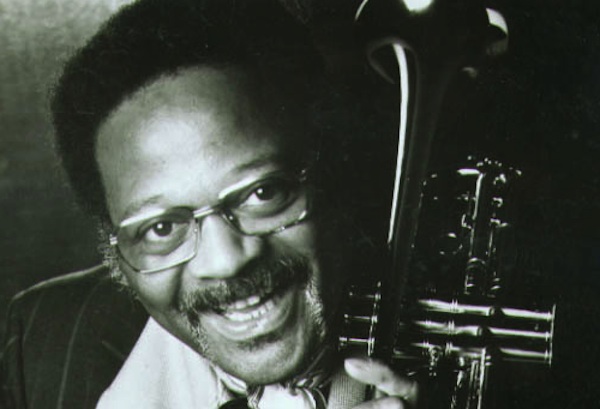Jan 13, 2026 2:09 PM
More Trump-Kennedy Center Cancellations
The fallout from the renaming of the John F. Kennedy Center for the Performing Arts to include President Donald…

Clark Terry (1920–2015)
(Photo: DownBeat Archives)While many listeners discovered Clark Terry during his time with The Tonight Show band in the 1960s and ’70s, a new generation of fans has emerged, thanks to Alan Hicks’ 2014 documentary, Keep On Keepin’ On, which chronicled the trumpeter’s mentorship of pianist Justin Kauflin, then in his twenties.
But Terry’s support for young players began long before then. Apart from being one of the most distinctively melodic and humorous voices in the trumpet lineage, Terry (1920–2015) remained a fierce ally of emerging artists throughout his career.
“Clark Terry embodied the beauty of what our jazz family was, and is, and did so until his final moments,” said longtime friend and collaborator Quincy Jones. “When we were coming up in the ’50s as young beboppers, we had no choice but to stand together, because all we had was each other. For Clark, that was the essence of what our music was: family, tradition, life, love, sharing, giving back, encouragement and staying involved in the perpetuation of our craft.”
As a teen, Jones frequently would receive informal instruction from Terry amid the trumpeter’s busy tour schedule. Terry’s willingness to share had an impact on the 14-year-old, one that would reverberate as Jones began to “pay it forward,” mentoring those coming up behind him. “It would be years later,” Jones said, “after I began touring with [Lionel Hampton] and Dizzy [Gillespie], that I fully understood how exhausted [Terry] would have been after a long night working—and how truly generous and kind he was to me.”
In 1959, Terry put his money where his mouthpiece was. He left Duke Ellington’s band to join his young mentee’s group for a gig in Paris—a gesture that Jones described as one of the most humbling moments of his life. Terry seemed to view taking chances on rising and unknown players as an important opportunity. Perhaps no one remembers that investment as viscerally as vocalist Dianne Reeves.
“Clark really saw the content of people’s artistry before anything,” said Reeves, who credits Terry as the artist who “discovered” her. “So, he invited young women, young men, young women of color, young men of color—it didn’t matter. He saw you. And that is a very, very powerful gift that he gave all of us, because it helped us to move forward.”
Reeves views her time on the bandstand with Terry as a “living school” whose fearless professor prompted her to take risks of her own. “I started to experiment,” she said. “He would egg me on or pull me back. His belief in me gave me an immeasurable amount of confidence.”
Reeves and Jones recount their time with Terry as a holistic study through which they learned how to conduct themselves both on stage and off.
Drummer Sylvia Cuenca spent nearly two decades touring with Terry, who got her phone number one night after she sat in with him at the Village Vanguard. “A few weeks later, he hired me for a Grammy party gig and he continued to hire me for another 17 years,” Cuenca said. In addition to absorbing his “concise and lyrical phrases locked into time,” she, too, came to know Terry’s three-dimensional mentoring. “Observing him off the bandstand,” she said, “I’ve realized the importance of handling oneself with poise, dignity and class.”
Like that of Art Blakey, Terry’s influence as a mentor extends through multiple generations. “He was one of the greatest trumpeters to ever grace the planet,” Jones said. “His shoulders are among those I was allowed to stand upon to become the musician that I am today.” DB

Belá Fleck during an interview with Fredrika Whitfield on CNN.
Jan 13, 2026 2:09 PM
The fallout from the renaming of the John F. Kennedy Center for the Performing Arts to include President Donald…

Peplowski first came to prominence in legacy swing bands, including the final iteration of the Benny Goodman Orchestra, before beginning a solo career in the late 1980s.
Feb 3, 2026 12:10 AM
Ken Peplowski, a clarinetist and tenor saxophonist who straddled the worlds of traditional and modern jazz, died Feb. 2…

The success of Oregon’s first album, 1971’s Music Of Another Present Era, allowed Towner to establish a solo career.
Jan 19, 2026 5:02 PM
Ralph Towner, a guitarist and composer who blended multiple genres, including jazz — and throughout them all remained…

Rico’s Anti-Microbial Instrument Swab
Jan 19, 2026 2:48 PM
With this year’s NAMM Show right around the corner, we can look forward to plenty of new and innovative instruments…

Richie Beirach was particularly renowned for his approach to chromatic harmony, which he used to improvise reharmonizations of originals and standards.
Jan 27, 2026 11:19 AM
Richie Beirach, a pianist and composer who channeled a knowledge of modern classical music into his jazz practice,…